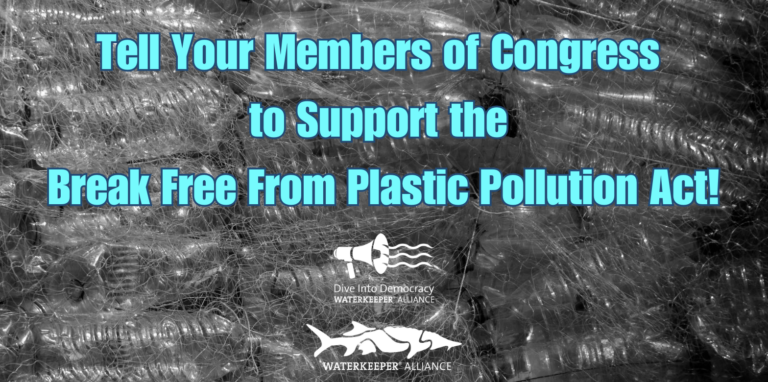Tell Congress to Pass the Break Free From Plastic Pollution Act!
By: Thomas Hynes

The Break Free From Plastic Pollution Act, which was first introduced in 2020 and updated in 2021, will soon be reintroduced in both the U.S. House of Representatives and the U.S. Senate. This bill represents the most earnest commitment on behalf of the federal government to ending the plastic pollution crisis. That is why we are urging Congress to protect our waterways and communities from the tidal wave of plastic pollution.
Will you take a moment and urge your Member of Congress to co-sponsor this crucial bill before the plastic pollution crisis gets even worse?
And, make no mistake about it, the plastic pollution crisis will get worse.
Every year, there are nearly 400 million tons of plastic created and that number is poised to triple by 2050. In spite of this glut of production, less than 10% of all that plastic will end up getting recycled. It begins to explain why the amount of plastic in the world’s oceans is expected to double by 2050. .
Making matters worse, the facilities that convert petroleum and fracked gas into plastic compounds release a host of other toxic pollutants, including benzene and dioxins, into waterways and fenceline communities. Other wastewater pollutants include phthalates, a known cause of developmental and reproductive toxicity in humans, and polycyclic aromatic hydrocarbons, which cause cancer, damage organs, and suppress immune systems.
Plastic production facilities also push massive quantities of plastic pellets and other plastic particles into waterways through mishandling and stormwater discharge, affecting not only the water quality, but also the recreational and cultural uses of our shorelines and waterways.
If passed, the Break Free From Plastic Pollution Act would control the discharge of plastic production chemicals and plastic pellets, such as nurdles and other pre-plastic materials entering waterways. It would also compel EPA to conduct a full review of the toxic chemical and solid waste pollution potential for discharges to waterways from plastic production facilities, in order to better protect communities that are currently bearing the brunt of the toxic impacts and environmental injustice of plastic. EPA would be directed to revise effluent limitation guidelines and ensure that the best available technology applies to existing plastic production facilities.
We have the chance to address this crisis. Join us in demanding Congress take action today.
The Break Free From Plastic Pollution Act would also:
-
create a moratorium on new or expanded permits for certain facilities that manufacture plastics until regulations are updated;
- establish requirements and incentives to reduce the production of plastics;
- increase efforts to collect, recycle, or compost products and materials;
-
make producers responsible for collecting, managing, and recycling products after consumer use;
- phase out a variety of single-use products; and
- limit the export of plastic waste to other countries that are unprepared to safely process it.
We must act today to confront the mounting plastic pollution crisis!